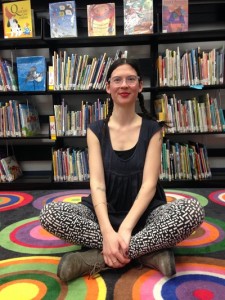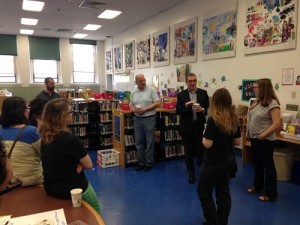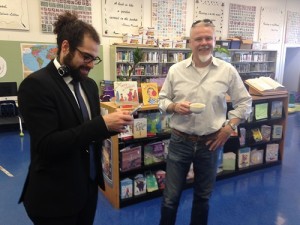Turning the School Library into a Community Hub: Here's How
Massachusetts school librarian Liz Phipps-Soeiro opens her space for weekly "Coffee & Conversations." Participants have included Cambridge Mayor David P. Maher.

Liz Phipps-Soeiro All photos courtesy of Phipps-Soeiro.
The school library is a unique forum to enlist families in broader community engagement. With this in mind, I wanted to create a program to bring families into my school library at Cambridgeport School, a public pre-K−5 school in Cambridge, MA. My goal was to foster and promote community literacy and greater civic involvement by creating a forum for conversation and collective problem-solving at the library. Basic questions I wanted my program to address include: Who are the decision makers in the schools and city? How do I best engage with these people? What role as a citizen do I have in school and civic decisions? I decided to host an ongoing family event called “Coffee & Conversations.” On Friday mornings, after families drop their kids off, I encourage parents and caretakers to stay and mingle in the library. One Friday each month, I invite a community member to join us. Over the last three years, I’ve hosted mayors, city council members, school committee members, district administrators, community organizers, and many others. My guests have consistently expressed an appreciation for the opportunity to talk to parents. While I can’t reach every family with these meetings, I can create an epicenter of engagement and community activism within the school. The event also allows me, as the school librarian, to reach beyond the teacher librarian and student interaction.
Cambridge Mayor David P. Maher (middle, in suit) visits "Coffee & Conversations" as a guest speaker.
A prime example of how Coffee & Conversations served as a springboard for activism and civic engagement involves Cambridgeport School’s playground. A few years ago, we went from serving a K−8 to a pre-K−5 population. Teachers, parents, and surrounding neighbors recognized that our playground could be updated to better serve our new student population. I organized a Coffee & Conversations event with Cambridge Mayor David P. Maher, School Committee Member Fred Fantini, and our City’s Educational Liaison, Alanna Mallon. Parents spoke directly to the leaders in our community, and we created an action plan for the new playground, which will be ready next summer. The program’s benefits are endless: a recent school committee member’s visit was a chance to discuss school policies and question their effectiveness. A visit from Cambridge’s Vice-Mayor Dennis Benzan led to a deeper understanding of the challenges and positive aspects of living in a growing city. Benzan also talked about new STEAM opportunities for students and their families. Cambridge City Council Member Nadeem Mazen helped to find a new space for our school’s art show. The school nurse joined as a guest during a lice infestation, which was impacting student attendance. Parents asked questions about prevention and treatment for their children. Coffee & Conversations has had an impact on our school, neighborhood, and community. Here are steps for getting one started on your own.
City Council Member Nadeem Mazen (left) programs a parent's phone number into his phone to continue a conversation.
Get administrators on board
Talk with your building administrator about how hosting a program can position the library as a community hub and a resource for networking with families and staff. Explain that having the library as a nerve center of information and networking reflects well on the school as a whole. My principal, Katie Charner Laird, said, “I think that all principals care about building community… There is a great deal of research supporting the notion that families, even just physically being in the school, makes a difference; through this action, they are communicating that school matters, school is important, and school is a place for all families.”Rally the support of your school’s parent organization
If your school has a parent organization, present the idea to them. Most likely, they will champion it and bring it to the broader parent community. They also have a pulse on what parents are looking for. Also, with input, you can tailor your program to answer the needs of parents.Reach out to the community
Each school community will be different. After identifying pressing topics, you will want to begin introducing yourself to families, explain what your goals of civic engagement are, as well as what the dialogue will be for your program. An email or letter works best for this. You could begin by suggesting guests who have direct ties to the schools, including principals, district administrators, superintendents, and school committee members. After that, consider city council members, mayors, and other community organizers. “I think [city councilors] come into office assuming that we're representatives, and then after a very short while we're vested with this extraordinary power to choose for people rather than with them,” Cambridge City Council Member Nadeem Mazen said during his visit. “I don’t feel this is okay, and the actual presence of people in our everyday routine is critical, especially in the civic-oriented and educational locales where the city's work is really being done.”Follow and sustain the program
Routine, routine, routine. Find a time in your schedule that will allow you to host your program in a regular manner. While I don’t have guest speakers every Friday, I do serve coffee to provide a time when I am available for book recommendations and when families can build connections in the school and ask school-related questions. It’s also an opportunity for me to assess school concerns, which informs whom I invite next. Announce your guests in advance. Utilize your school’s website, your own website, whiteboards, chalk boards, and Twitter—whatever platform you have access to. Advertise!Keep the budget low
The cost for such a program is minimal. My guests come without payment, so the only money I spend is on coffee, cream, and the occasional breakfast snack. These fees are often null, because people are happy to donate these items. (A parent donated a coffee pot a few years ago, and many people will bring in a mug for their free cup of coffee.)Celebrate and broadcast the benefits
Because of Coffee & Conversations, parents in my school access my professional knowledge and skill far more than they would otherwise. Families have come to the library to share their voice, get book recommendations, get to know one another, and advocate for their children in a relaxed environment.Liz Phipps-Soeiro is an elementary school librarian, mom and active community member in Cambridge, MA. Check out her other projects at www.cambridgebookbike.org and reflectivelibrary.blogspot.com.
RELATED
RECOMMENDED
CAREERS
The job outlook in 2030: Librarians will be in demand
CAREERS
The job outlook in 2030: Librarians will be in demand
ALREADY A SUBSCRIBER? LOG IN
We are currently offering this content for free. Sign up now to activate your personal profile, where you can save articles for future viewing






Add Comment :-
Comment Policy:
Comment should not be empty !!!
Beth Olshewsky
Hi Liz, Thanks for your work and sharing your ideas with your community and with us, the broader community of school libraries. I particularly appreciate your idea of positioning your library not only as a community hub, but also as an instigator of civic engagement. I can't help but think that, just as having parents be present in the school validates the importance of school for children, having civic leaders be part of that school community interaction and inviting dialogue with your families validates the importance of civic engagement and contribution to these same children as well as to their families, and also validates for the civic leaders and service providers the importance of their role in supporting the children, their families, and education (including the school library). Sorry for being so long-winded, just really want to say: good on you- you rock! Thanks, BethPosted : Apr 29, 2015 02:04
Dana Tunick
Hey Liz, Not sure if you remember me, we attended Lesley University together and worked on OSP's production of All's Well that Ends Well. I think it's a fabulous idea to get parents involved. I am also a librarian and on back to school night, I would leave a sign up sheet in all of the classrooms asking for volunteers for the library. I would never get more than 5, and of those, only two actually commit. My questions for you are: 1) How do you spread the word about Coffee and Conversation? Do you literally stand at the door greeting kids and asking the parents to stay, or do you send notes home? 2) What do you do if the majority of your parents work and can't stay (or drop their kids off on a carpool line and don't come in to the school)? Thanks!Posted : Apr 27, 2015 08:49
Cheryl
This is a very useful article. Thank you for providing a clear plan for how to make this happen. The only question I have is do you have a flex schedule library? Ours are fixed and I have classes right at the beginning of each day so it is difficult to schedule something like this on a regular basis. I do think first thing in the morning is the best time. I am hoping to host two parent coffees on specific topics by the end of the school year, but I do need to figure out my classes in order to do this.Posted : Apr 22, 2015 05:18
Trisha Connolly
This is a fabulous idea! I'm going to run it by my principal. Thanks for sharing!Posted : Apr 22, 2015 01:09